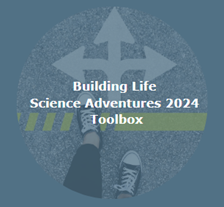Building Life Sciences Adventures 2024 - An Overview

By Monalisa Breazu, Learning & Development Administrator
The two-day online careers conference, which took place on 12-13 March, was a remarkable event that brought together exceptional employers, students, early career seekers, and universities. The main focus was on creating meaningful careers within the Life Sciences sector rather than just securing jobs and so the panel discussions provided valuable advice and insights to help ensure the sector's continual improvement.
The BLSA conference offered a platform for engaging discussions through eight lively one-hour sessions spread across two days. Topics ranged from inclusive pathways and overcoming imposter syndrome, to navigating industry barriers and choosing the right employer. It aimed to bridge the gap between aspiring professionals and employers, fostering a two-way process of building successful careers and great teams.
Don’t worry if you missed this year’s Building Life Science Adventures (BLSA) conference, because we’ve got you covered! Below, you will find some key takeaways and recordings of all panel discussions.
Inclusive Pathways: Embracing Neurodiversity in Life Sciences Watch here…
You don’t have to be an expert to care and recognise the importance of embracing neurodiversity and inclusion in the workplace. A thought that stuck with everyone was to never assume whether someone is neurodivergent. ’When you’ve met one neurodivergent person, you’ve met one neurodivergent person.’ Be curious and keep an open mind.
It’s important to highlight that there is always an opportunity for a rich blend of people who can bring so much to the workplace. Take a bit of investment in terms of time and resources to build that curiosity and create that brave space for conversation. Always embrace the dialogue of difference; welcome the divergences or how colourful your environment is so you can embrace it and really work and focus on people’s strengths (superpowers) and abilities to provide a positive impact and outcomes to your organisation.
Raise awareness internally as often as possible. Make sure that your workforce is educated on the subject; you never know what people deal with outside of work. By providing a platform and enabling them to gain that knowledge, it’s a win for them.
‘This is still an emerging topic; one day there will be no labels.’ André Skepple
How to Develop the Best Teams? Watch here…
‘You’re not grounded if you talk too much about strengths…’ Geoff Dobson
Be sure to recognise what people can bring and what their strengths and capabilities are. This pays dividends very quickly and can be very uplifting and empowering. In terms of individual performance, it’s better to think of the top three or four strengths that you have; this enables you to really put some effort into achieving your best. Thus, in a team context where every individual brings their top strengths to the table, it is more manageable to collectively achieve a single development goal at a time.
The idea of culture can and does develop organically within an organisation But if you want it to develop positively, you should really pay attention to it and do a good job of looking after your people; make sure that you are listening to them. You want your people to enjoy their work, and finding the mechanism to make that happen is so important.
Your team will gel together more easily if they share common values. So, if you're getting that value piece right, you're measuring it and you're making sure that everybody is essentially on the same page, the team will work well together.
Overcoming Imposter Syndrome Watch here…
It’s really difficult to teach people that you don’t have to be a perfectionist. What you have to do is just do a good job and do it right. Remember that getting it right the first time can’t always be attained. We also need to learn from failures, and the pressure of thinking that you must get it right the first time can increase the imposter feeling.
‘FAIL - First Attempt in Learning’ Jon Green
When you fail at something and believe you are letting yourself down, this is just a learning curve. Don't look at the negatives and think you've let yourself down. Go back and say, Ok, this is what I've done; what was successful? If I look back, would I do it the same again with the information I had at that moment in time? So don't ever feel like you've completely bombed out, because you probably haven't; you're just being hard on yourself. The self-critical aspect and the desire to be perfect are really common with people who experience imposter feelings. It is imperative that we highlight the importance of embracing imperfection and allowing room for collaboration and feedback. It’s okay to share initial drafts or thoughts; this means you are showing openness to input and improvement.
Be kind to yourself. When you have those imposter thoughts and start feeling that you’re not doing something well enough, take some time to think about all the evidence and achievements that suggest otherwise.
Is a PhD Worth It? Watch here…
We all know that studying for a PhD entails acquiring a range of transferable skills inherent to the depth of research involved. Critical thinking, analytical abilities, problem-solving, and diligence in research are some of the fundamental skills honed during doctoral studies.
Anji Miller highlighted that there are skills applicable both inside and outside the lab, noting that while multitasking and time management are crucial in laboratory settings, they may require adjustment for other contexts. Presentation skills, for instance, differ between scientific presentations and other forms such as business plans or proposals. Networking skills similarly demand adaptation, with an emphasis on finding common ground rather than solely showcasing one's research.
Whether a PhD is worth it for you, ultimately depends on the role you are pursuing and where your interests lie. For non-research roles, like scaling up an existing product, the deep research skills of a PhD might not be necessary. Instead, what's valued is the ability to execute tasks efficiently. A PhD could be a great fit for individuals who are deeply curious and enjoy exploring various topics in-depth. However, the risks involved in pursuing a PhD, such as the uncertainty of post-doc positions and the potential entrenchment in academic paths, may not appeal to some, and that’s okay. 
For anyone either doing a PhD and thinking, 'Where do I go from here?' and not getting despondent about whether it was worth it or not, remember to think of it as a very personal journey. Seeing it as a personal journey, being part of your development, that's something that we should never lose sight of. A PhD, any job, any career, it should always be viewed as a journey.
The Challenges of Benchmarking in Remuneration Watch here…
From an employer’s perspective, the panel emphasised the importance of acquiring primary data when benchmarking, whether through agencies or by directly engaging with candidates and the market. This ensures accuracy and relevance in understanding salary benchmarks and benefits offered within the industry. It was noted that benchmarking should not be limited to salary alone, but should also encompass benefits and consider skill-based, as well as role-based benchmarks.
The need for organisations to be bold and authentic in defining their EVPs should be crucial, and they should always identify and celebrate their unique qualities, values, and culture rather than adopting generic messaging. Regularly reviewing and updating EVPs is essential to ensuring alignment with organisational growth and changes, maintaining relevance in attracting and retaining talent.
Always remember to not make assumptions about employee preferences, and make sure to highlight the importance of flexibility in benefit offerings to cater to diverse needs.
If you are a career seeker, make sure you conduct your own research on market rates for salaries and benefits, utilising platforms like Glassdoor and job advertisements.
It is important to keep salary expectations close to the chest and refrain from providing a specific number upfront. Instead, inquire about the value the company places on the role and the individual, considering the full remuneration package, including benefits and cultural fit.
Networking and seeking advice from industry contacts when evaluating potential employers are also important. Openness and transparency about salary expectations are encouraged, as discussing remuneration openly can lead to fairer compensation practices and foster better discussions.
The last tip given by our panel to applicants was to approach salary negotiations with confidence, asking for explanations if offered salaries fall below expectations. Requesting a breakdown of how the figure was determined puts the onus on the employer to justify their offer and ensures a more transparent negotiation process.
The Role of Social Media in Recruitment & Career Development Watch here…
As an employer, assuming that LinkedIn is your main social media platform, this is your company’s shop window. It’s important to look like humans work for your company, especially when using AI tools to post a job advertisement, for example.
LinkedIn has some great tools, but they are also very expensive tools, and you have an absolutely free tool to use, which is yourself and your computer. You can post all this free content to engage and attract the right people.
It is important to take your time to ensure you are engaging and attracting the right people who align with your company’s values. This can involve showcasing your team and its talents, which is an amazing way to make your team feel valued and special and show others who you really are as a company.
Keeping your LinkedIn connections up to date and refreshing them once every 6 months can perhaps also help make sure you are following the people you should be following and keeping in line with your values and requirements, whether you are a job seeker or an employer. 
When it comes to AI, generating ideas and clarifying thoughts is very helpful, but it's important to emphasise that writing content in your own words will preserve authenticity. For instance, ChatGPT can save you a great deal of time, but creativity should be enhanced, not replaced, so you shouldn't rely on it too much. If you are using AI to generate cover letters when applying for a job, be mindful that this can be easily detectable, particularly when applying to small organisations that take the time to read every application, while large corporations often use automated screening processes. It is okay to rely on AI tools to help manage your day-to-day tasks, but they are not there to do your work for you.
How do Big Pharma and Start-Ups Compete for the Right People? Watch here…
Is it really a competition, or are the two just very different?!
When we think about company culture, its importance is no different whether you are in big pharma or a start-up. In terms of hiring processes, the importance of ensuring that interviewers represent the culture and team that candidates will be joining is key, as is ensuring a strong Employee Value Proposition (EVP).
Ultimately, people are at the heart of any company, regardless of its size, and building a strong team starts from the top down.
The panel made the interesting point that there's a lot of interest from people in Big Pharma to join start-ups and early-stage companies because they see it as an opportunity to have a broader role and be involved in various aspects of the business. So, if you're a candidate coming from Big Pharma and wish to move over to working in a start-up or a small biotech company, you want to highlight experiences where you've shown creativity or dealt with ambiguity across different areas of your previous job. These are the things that recruiters will be looking at to determine if a candidate is a good fit. On the flip side, if you're a candidate coming from a small biotech company and want to land a job in Big Pharma, it's about showcasing your competencies and mindset that align with the values of the company you're applying to. While your CV is important, it's during the interview that you can truly showcase how your experiences align with the company's needs. So, it's crucial to prepare and articulate how your skills can contribute to the bigger picture during that stage.
As a jobseeker, it's so important to be consistent, to think about where your skills can really come to bear, and how you customise your applications. If you're an employer, being clear on your value proposition and being able to demonstrate it for multiple people is key.
UK vs USA - Recruitment Talks Watch here…
In terms of demand for people in life sciences, it's rather similar in both regions, but there are some interesting differences. For example, both regions have strong educational hubs that foster
start-up and seed companies, which then contribute to the growth of science parks. However, there are slight variations in healthcare systems between the regions. In the US, individuals might lean more towards larger pharma companies and biotechs, due to differences in salary packages and competitiveness. On the other hand, in the UK, everything is relatively close together, making travel easier compared to the US, where distances are greater. So, while the opportunities are similar, there are some unique factors to consider in each region.
When looking at salary ranges, cost of living, and employment practices, in the UK, there are some restrictions against asking about current salaries, but candidates are expected to share their salary expectations. This shift in questioning has required adjustments in recruitment processes.
Moreover, in the US, relocation for career advancement is seen as ambitious, whereas in the UK, there's more of a social concern about dying industries and townships.
To hear about career development, mobility, and future outlooks, make sure to watch the recording.
